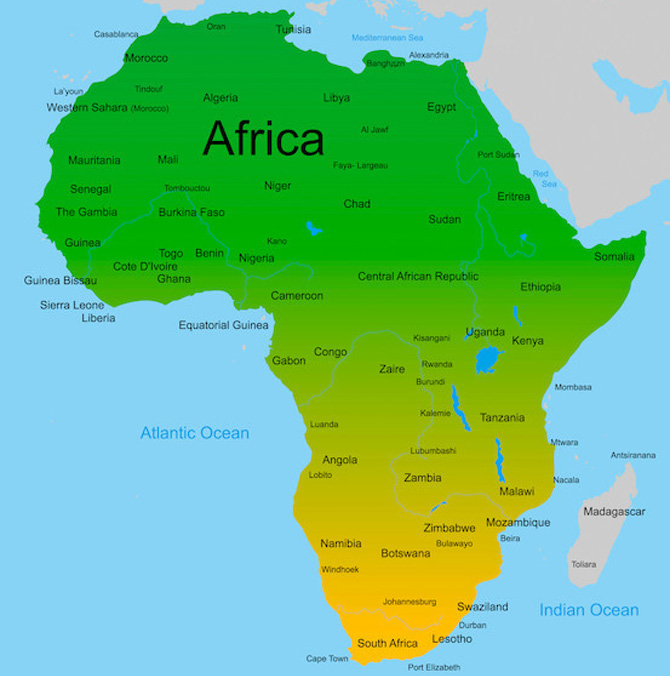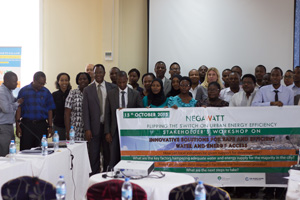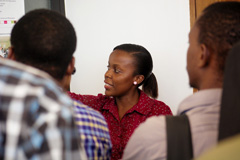
Africa is 'continent of the future'
International relations
Ebola, poverty and misery. The image of Africa is as perfunctory as it is misleading. Our perspective of the continent must be updated — not least for KTH's students and future engineers.
"Africa's challenges represent a goldmine of possibilities for innovative solutions. Africa is the continent of the future," says Ramon Wyss, vice president for international affairs at KTH.
It is easy for those from the industrialized world to get mired in stereotypes when dealing with the concept of Africa. The second largest continent consists of 55 countries, each with its unique political and socio-economic conditions. Africa is home to more than a billion people whose everyday lives cover a breathtaking range of realities.
KTH has held a variety of collaborations, exchanges and research projects with various African countries, dating back about two decades, often with funding from the Swedish International Development Cooperation Agency (SIDA). The work mainly falls within the areas of information and communication technology, energy and infrastructure. Projects have been implemented in countries such as Tanzania, Rwanda, Kenya, Uganda, Mozambique, Ghana, Botswana, Ethiopia and Egypt.
For example, in one project students from KTH and Tanzania co-developed a solar-powered, energy-efficient router for broadband in the Tanzanian countryside.
"Teachers at KTH have long worked with challenge-driven learning, in which students solve real social problems through projects," Wyss says.
Research and exchange happens at different levels. Last spring, a handful of teachers from KTH worked in Dar es Salaam, Tanzania, on behalf of the World Bank. The teachers coached student teams in the global Negawatt Challenge, in which local teams aim to find energy-efficient business solutions for cities, using the latest technology. The municipality of Dar es Salaam wanted the city to prioritize water and sanitation. In November, the Negawatt contest will conclude at Barcelona's Smart City Expo, where the teams can try to gain international investors' interest in their proposals. KTH will be on hand with its team from Dar es Salaam.
"It is a feather in the cap for KTH to be working with the World Bank in this area," Wyss says. "There are few universities that earn that trust."

The competing teams in Tanzania have different suggestions on how to resolve the issue of sustainable water and functioning sewage systems. Today, more than half of all the water in Dar es Salaam goes to waste due to leaky pipes. One of the teams proposed a solution that would use sensors and digital technology to identify where pipes have broken.
"Many countries in Africa offer engineering challenges of a completely different class than in Sweden. How to find innovative solutions using smart technology to create a sustainable welfare is an issue for the future of our world," Wyss says.
Many people's view of Africa and its countries was inherited from the colonial period and an indirect justification of it, says Wyss, who stresses how important it is to nuance and renew the image. The lecturer, Hans Rosling, has already opened the eyes of many in Sweden with his insights into the migrant crisis, he says.
Ramon Wyss cites examples of areas where Africa has been at the forefront. Mobile banking actually first developed there, and Africa early on had strategies to keep roaming costs down between countries in the same region. Africa is the world's second largest mobile phone market, and with the greatest growth. There are also many young people who are passionate about making the world better.

"The students do not at all reflect hopelessness, and our teachers have witnessed their fantastic drive. They are borne up by the idea that the possibilities are many, and nothing is impossible."
Many economists predict that in the next 50 Africa will become a market with a capital M. The continent has experienced strong economic growth in recent years.
When the President of Tanzania visited Sweden in the beginning of June this year, he declared that with the economic growth that Tanzania has experienced, the country would no longer need outside help in five years, Wyss says.
"Attitudes toward the continent and the focus will change. What is gratifying at KTH is the teachers' and students' strong interest, which is visible not least in the demand for making 'minor field studies', i.e. small on-site projects in Africa. There is so much to do and develop, Wyss says.
Jill Klackenberg

